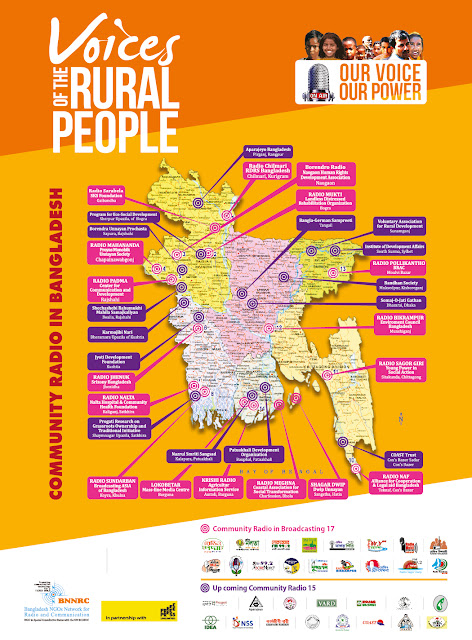Bangladesh NGOs Network for Radio and Communication (BNNRC) is implementing its Community Media Fellowship Program for Dalit youth & youth women in Media and Journalism aiming to ensure the access of Dalit communities to the mass media with support from Free Press Unlimited.
The duration of the Fellowship Program is three months. This is the sixth batch of the program engaging the rural marginalized youth communities in collaboration with Free Press Unlimited. The activity has started on 1st June 2017 and will continue up to 31st August 2017 in line with Sustainable Development Goal 10.
Total of 16 fellows has been working at 10 community radio stations in the country under the program. Already They have produced and broadcasted altogether 160 audio programs (news bulletin/case study/life sketch etc.) and prepared 32 reports and feature for the local newspaper. These programs and reports covered the issues like education of girl and children, women empowerment, their rights, child marriage, mother & child’s health, adolescent health, disability, transgender, ethnic and Dalits news and some success story.
To enhance these fellows’ understanding, knowledge and skills on community mobilization and journalism in line with Women-Child and Dalit issues a two-day long training workshop on “Fellowship for Youth and Youth Women in Community Media and Journalism” was organized on 17 August 2017 at YWCA Conference Room, Mohammadpur in Dhaka
The objective of the program is to facilitate in creating an enabling environment for the Dalits youth and youth women and enrolled in the media and journalism for developing as professional community media journalist in line with the Sustainable Development Goal 10 (SDG10).
During the workshop the Dalits youth and youth women fellows learned about basic journalism, news source, techniques of interview, challenges and way forward during interview, overview of Dalit Communities in Bangladesh and their sufferings and challenges, scope of radio reporting on Dalit Communities, radio news and program formatting, writing features in line with women, child and Dalit issues for newspaper, investigative reporting, technique and scope of investigative reporting for community media, process and technic of community mobilization and linking Dalit people with social safety net through Community Radio, Sustainable Development Goal, and appropriate use of social media and promoting issue based radio programs through social media.
The sessions were facilitated by Mr. Amin Al Rasheed, Joint Editor (news & current affairs) of Channel 24, Mr. Altaf Parvez of Alternative Research and Development Specialist, Mr. Nazrul Islam, Director (Training and Program), National Institute of Mass Communication, Government of the People Republic of Bangladesh, Ms. Rabeya Baby, Editor (Mohila Ongan/Women Page) of Daily Ittefaq, Ms. Farzana Rupa, Senior Journalist of Ekattor TV, Ms. Shahnaz Sharmin, Chief Reporter of Nagorik Television and Mr. Jahangir Ahmed, Assistant Coordinator (Web & Social Media) of BNNRC.
Mr. Reza Selim, Director, Amader Gram of BFES was attended as the closing ceremony where Mr. Avra Bhattacharjee, Deputy Director – Dialogue and Outreach, Dialogue and Communication Division, CPD and representative of the Citizen’s Platform for SDGs, Bangladesh and Ms, Elita Karim, musician and youth journalist and Editor of Star Youth Page of the Daily Star were attended as the as a guest in the training workshop.
A total of 26 participants from 10 Community Radio Stations participated in the program. Among the participants, there were 16 Fellows and 10 Mentors attending in this course.
The fellow participants were namely Johan Soren from Community Radio Padma, Rajshahi, Dalia Akter from Community Radio Lokobetar, Barguna, Sunity Sinha from Radio Pollikantho, Moulvibazar, Jahangir Alam & Nomita Chowdhury from Community Radio Mahananda, Chapainawabganj,. Luttfonnahar Happy & Sharmin Nahar from Community Radio Chilmari, Kurigram, Sharmin Akhtar Ankhi from Radio Sundarban, Khulna, Moly Rani Das & Ridoy Lal from Radio Bikrampur, Munshiganj, Tumpa Rani Paul & Subrata Halder from Community Radio Borendra, Naogaon, Lima Begum & Kamrun Nanar Tania from Community Radio Meghna, Bhola, Lata Rani Rabidas & Khilon Das from Community Radio Sarabela, Gaibandha.
The mentors were Sadi Mahmood Community Radio Padma, Abida Sultana from Community Radio Lokobetar, Tahmid Ahmed from Community Radio Pollikantho, Md. Noyon Ali from Community Radio Mahananda, Mizanur Rahman from Community Radio Chilmari, Robiul Islam from Radio Sundarban, Md. Musfiqur Salahin from Radio Bikrampur, Shahrina Sultana Jui from Community Radio Borendra, Mosume Das from Community Radio Meghna, Afsana Mimi from Community Radio Sarabela.
It is to be mentioned here that since 2013 there were 87 youth women from 16 Community Radio Stations who have received this Fellowship on Journalism under the fellowship program.
The Community Radios are becoming an active ground for organizing dialogues at rural level. These dialogues will help the rural mass to find out their own voice and ensure leverage their free opinion in respect of social, economic, political ,cultural and environmental issues.



